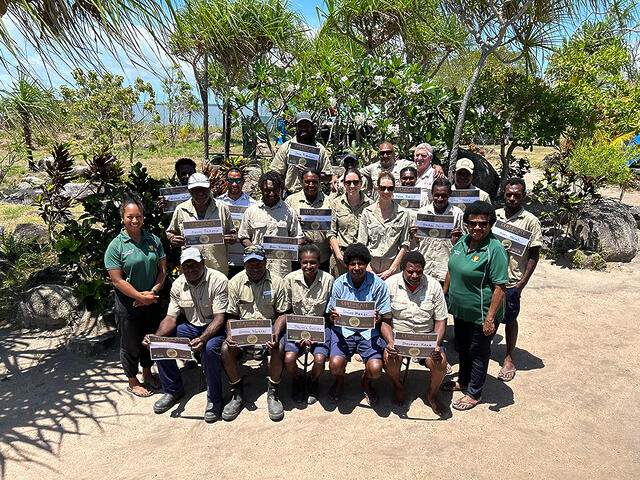Refresher fruit fly training delivered with Papua New Guinea
Australia and Papua New Guinea (PNG) continue to deliver great results for fruit fly analysis and awareness in the remote Treaty Village communities of PNG’s Western Province. The Treaty Village Fruit Fly Trapping Program supports food security for PNG and promotes stronger biosecurity outcomes for both countries. The success of this work is a testament to the close collaboration between the department INLOC Group and PNG’s National Agriculture and Quarantine Inspection Authority (NAQIA).
The program commenced in 2022 to monitor and manage pest fruit flies within Treaty Village communities. These include Oriental Fruit Fly (Bactrocera dorsalis), as one of the world’s most damaging horticultural pests, and also the diversity of other pest fruit flies present in the area. At the time, there was no known active management of fruit flies in the Treaty Villages and little information on the impact of fruit flies on food security for PNG. Through this project we now have 18-months of fruit fly trapping data indicating there are a significant number of fruit flies in all Treaty Village communities, showing a similar seasonal trend to what is seen in the Torres Strait. This analysis is strengthening the knowledge around fruit flies, and now supports better management and biosecurity outcomes for both PNG and Australia.
To support this program, fourteen Treaty Village rangers participated training on Paho Island in PNG between 30 October – 3 November 2023. This included refresher training for fruit fly trap maintenance, updates on trapping results, and discussions and demonstrations of fruit fly management techniques. Demonstrations included both traditional techniques (fruit wrapping in newspaper and banana leaves), and more commercial techniques (bait spraying and blocking) routinely used in the Torres Strait. Teams are now collectively discussing the most practical and culturally appropriate management techniques that could be trialled within the Treaty Village communities.
“This training is essential for our people’s livelihoods. Better biosecurity means greater food security and higher crop yields for farmers to sell at the market,” said senior ranger, Melinta Gabitu.
The team showcased this great work during a visit by the outgoing Australian High Commissioner Mr Jon Philp, on his last official visit to Western Province, along with Western Province Governor Mr Taboi Awi Yoto and senior Provincial Administration officials. High Commissioner Philip expressed appreciation for the Treaty Village rangers and their contributions to the understanding of fruit fly impacts and on food security. He celebrated the success of the bilateral relationship between Australia and Papua New Guinea. He also noted the great value of having a First Nations Torres Strait Biosecurity representative at the training, further strengthening the community and cultural ties between our two countries.
View Original | AusPol.co Disclaimer
